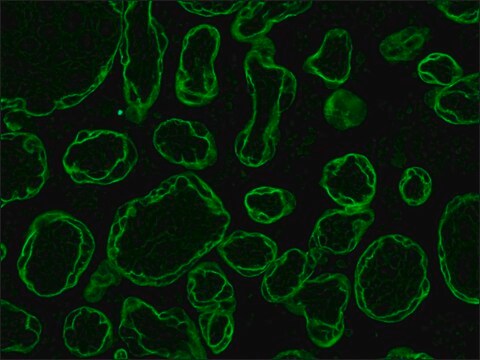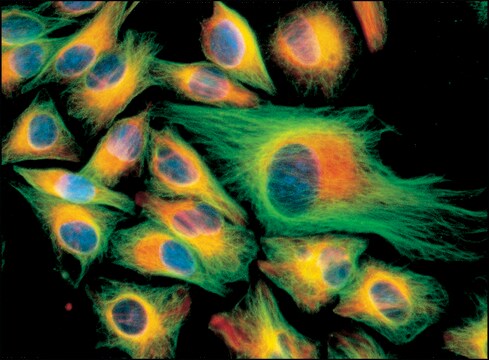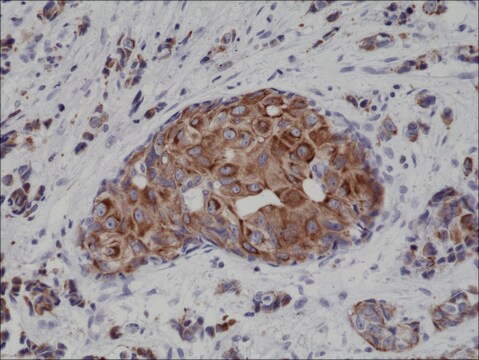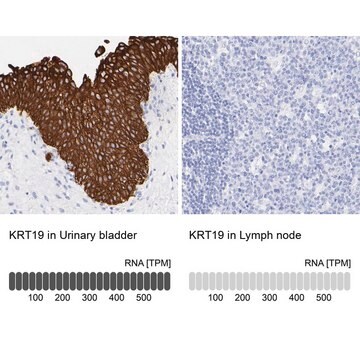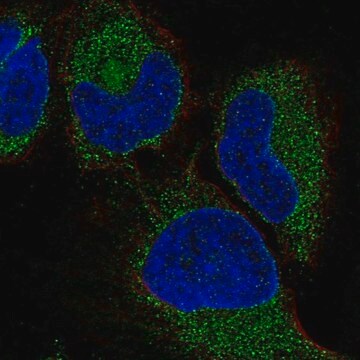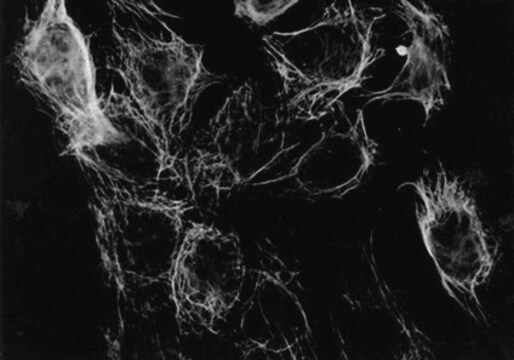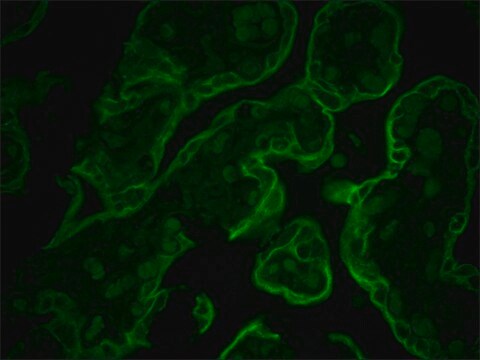ZRB1727
Anti-Cytokeratin 18 Antibody, clone 1G20 ZooMAb® Rabbit Monoclonal

recombinant, expressed in HEK 293 cells
About This Item
Prodotti consigliati
Origine biologica
rabbit
Livello qualitativo
Ricombinante
expressed in HEK 293 cells
Coniugato
unconjugated
Forma dell’anticorpo
purified antibody
Tipo di anticorpo
primary antibodies
Clone
1G20, recombinant monoclonal
Descrizione
recombinant, expressed in HEK 293 cells
Nome Commerciale
ZooMAb® learn more
Stato
lyophilized
PM
calculated mol wt 48.06 kDa
observed mol wt ~48 kDa
Purificato mediante
using Protein A
Reattività contro le specie
human, mouse
Confezionamento
antibody small pack of 25 μL
Caratteristiche più verdi
Waste Prevention
Designing Safer Chemicals
Design for Energy Efficiency
Learn more about the Principles of Green Chemistry.
Convalida avanzata
recombinant expression
Learn more about Antibody Enhanced Validation
sustainability
Greener Alternative Product
tecniche
affinity binding assay: suitable
flow cytometry: suitable
immunocytochemistry: suitable
immunohistochemistry (formalin-fixed, paraffin-embedded sections): suitable
western blot: suitable
Isotipo
IgG
Sequenza dell’epitopo
C-terminal
N° accesso ID proteina
N° accesso UniProt
Categoria alternativa più verde
Condizioni di spedizione
ambient
Temperatura di conservazione
2-8°C
modifica post-traduzionali bersaglio
unmodified
Informazioni sul gene
human ... KRT18(3875)
Descrizione generale
Specificità
Immunogeno
Applicazioni
Evaluated by Western Blotting in MCF7 cell lysate.
Western Blotting Analysis: A 1:1,000 dilution of this antibody detected Cytokeratin 18 in MCF7 cell lysate.
Tested applications
Western Blotting Analysis: A 1:1,000 dilution from a representative lot detected Cytokeratin 18 in A431, Raw264.7, and EL4 cell lysates.
Immunohistochemistry (Paraffin) Analysis: A 1:1,000 dilution from a representative lot detected Cytokeratin 18 in human liver tissue sections.
Immunocytochemistry Analysis: A 1:1,000 dilution from a representative lot detected Cytokeratin 18 in MCF7 cells.
Affinity Binding Assay: A representative lot of this antibody bound Cytokeratin 18 with a KD of 3.2 x 10-8 in an affinity binding assay.
Flow Cytometry Analysis: 0.1 μg from a representative lot detected Cytokeratin 18 in one million A431 cells.
Note: Actual optimal working dilutions must be determined by end user as specimens, and experimental conditions may vary with the end user
Descrizione del bersaglio
Stato fisico
Ricostituzione
Stoccaggio e stabilità
Note legali
Esclusione di responsabilità
Non trovi il prodotto giusto?
Prova il nostro Motore di ricerca dei prodotti.
Codice della classe di stoccaggio
11 - Combustible Solids
Classe di pericolosità dell'acqua (WGK)
WGK 1
Punto d’infiammabilità (°F)
Not applicable
Punto d’infiammabilità (°C)
Not applicable
Scegli una delle versioni più recenti:
Certificati d'analisi (COA)
Ci dispiace, ma al momento non ci sono COA disponibili online per questo prodotto.
Se ti serve aiuto, non esitare a contattarci Servizio Clienti
Possiedi già questo prodotto?
I documenti relativi ai prodotti acquistati recentemente sono disponibili nell’Archivio dei documenti.
Il team dei nostri ricercatori vanta grande esperienza in tutte le aree della ricerca quali Life Science, scienza dei materiali, sintesi chimica, cromatografia, discipline analitiche, ecc..
Contatta l'Assistenza Tecnica.